Grace Tierney's Blog, page 17
September 12, 2022
The History of Jargon
Hello,
Today I’m taking a look at jargon, inspired by my reading this week – “This is Going to Hurt” by Adam Kay. It’s the very witty, and thought-provoking diary of a junior doctor during the first six years of his work on the maternity wards of Britain’s NHS (publicly funded medical care). You may have read it yourself, or seen the excellent BBC adaptation starring Ben Whislaw (who will always be Paddington Bear to me but is a super actor in human form too).

Medical staff, by necessity, use precise terms (often from Latin) to ensure clarity in treatment of their patients, but we all know they have secret terms for tricky patients and incidents too. His revelations on that topic got me thinking about jargon in general. I used plenty of it in my former career in computing. Most jobs come with a scattering of jargon. Sometimes this is to exclude the customers and hide your irritation (yes users is spelled with an L if you’re on a tech support desk), other times it’s the quickest way to convey important information, and often it is simply the work terms which only insiders need to know.
If you’re frustrated with obscure jargon associated with somebody’s work, consider for a moment – do you have specialist terms in your own occupation? Susie Dent even got an entire book out of the topic – “Modern Tribes” which I read earlier this year.
Where does the word jargon itself spring from?
Jargon is one the French gave us. It entered English in the mid 1300s from Old French jargoun. At that time in French jargoun described the chattering, particularly of birds – much as we might use chirping today. It may have sneaked into English as a term for idle talk or thieves’ slang slightly earlier but the first use usually quoted is in Chaucer’s “Canterbury Tales” where he links jargon to the birds.
Some sources believe jargon in French was derived from the Latin verb gaggire (to chatter) which described speech the listener didn’t understand, but not all the dictionaries agree on that one. Either way, jargon is a surprisingly old word and has changed its use with time, as words often do.
During the British colonial period, even as early as the 1640s, jargon was a synonym of pidgin – used to bridge the gap between two people without a shared language using a few key phrases and words. This gave it an association with being an incomplete, or confusing subset of English and led to the idea of it being gibberish. From the late 1600s but definitely by the 1980s, jargon’s definition became more restricted when it was firmly associated with technical or specialised subsets of language such as the medical terminology I was reading this week, although I suspect even in Chaucer’s time certain jobs had their own jargon.
Until next time, happy reading, writing, and wordfooling,
Grace (@Wordfoolery)
p.s. This blog is an affiliate associate to Amazon US. I’m paid a small fee for any purchase you make through the Amazon links provided which helps support the running costs of the blog. Thank you.
September 5, 2022
Margaret, Pearls, and Margarine – How They Got Their Names
Hello,
I was enjoying a recent episode of the “No Such Thing as a Fish” podcast when they mentioned a connection between margarine and pearls. Not an obvious link to the casual eye so I had a root around and discovered the Margarets of the world are involved too.
Margaret, is a female first name dating to around 1300. It entered English from Old French. In modern French the name is Marguerite. The French borrowed it from Late Latin Margarita (pearl) from the Greek word margarites (pearl).
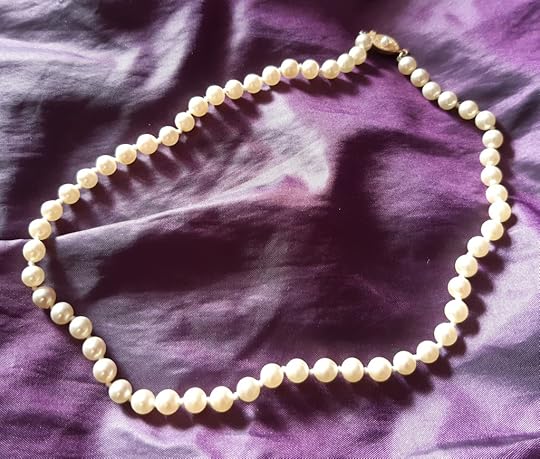 Margaret’s pearls?
Margaret’s pearls?Beyond the Greek, the connections are disputed. The Oxford English Dictionary believes it to have been adopted from an Oriental language while other sources suggest Middle Persian marvarit (pearl) or Sanskrit manjari (pearl, flowering bead). There’s also marjan in Arabic but that may come from the Greek.
Old English also had meregrot which translated as sea pebble which is an excellent term for a pearl in my opinion. The term was used to describe something as being of excellent of priceless quality in Middle English which should please all the Margarets out there, however there was also the phrase derk margaryte which was for a corrupted conscience. Those Margarets had their dark side too.
As for margarine, the butter substitute, it arrived in English in the late 1800s directly from French, like Margaret a few centuries earlier. Margarine was invented by a French scientist in 1869 who went by the charming name of Hippolyte Mège-Mouries. You do not meet many Hippolytes these days.
Hippolyte’s product was named thanks to a chemical term margarin coined earlier in the 1800s by a French chemist called Michel Eugène Chevreul for a fatty substance obtained from animal and vegetable oils – margaric acid (or margarique) which was a literal borrowing from the Greek word for pearls thanks to the lustre of the crystals involved. This term isn’t used in chemistry anymore but it persists in the word margarine.
If you chat to a Margaret about the origins of their name this week I suggest you skim over the whole margarine connection and head directly to sea pebbles and beautiful strings of pearls.
Until next time, happy reading, writing, and wordfooling,
Grace (@Wordfoolery)
August 29, 2022
Clam, Clammy, Close – Their Word History
Hello,
This week’s investigation is with thanks to friend of the blog, Rick Ellrod, who asked me one day if clammy weather is related to clams. Summer seems the right time to investigate and I threw in close too as I’ve always wondered about that.
Let’s start with the clam. It’s a bivalve mollusk and the word for it arose around 1500 in English but it was an earlier word in Middle English where it described a vice or clamp in the late 1300s and came from an even earlier variant clamm (to grip) in Old English. All of these arose from variations of klam (to squeeze together, constrict, or embrace) in German, Old High German, and Proto-Germanic which suggests that all the words relate back to the mollusk itself which was known for tightly closing its shell.
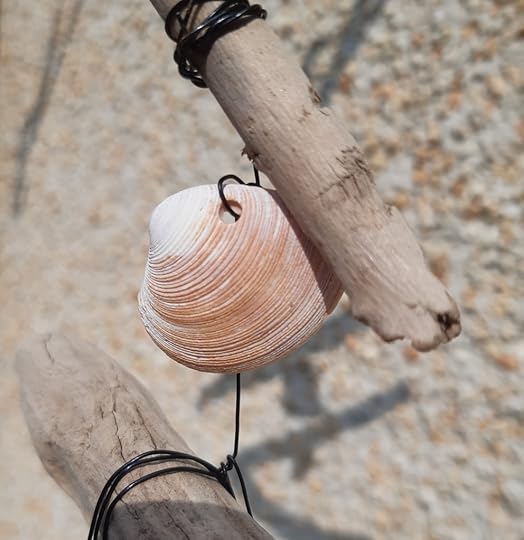 A clam shell in my Valhalla ladder
A clam shell in my Valhalla ladderI was listening to a podcast last night (“No Such Thing as a Fish” by the Qi Elves) which mentioned clams and that they are used in some cities to check water quality. The clams and scallops are filter feeders and they shut their shells if they detect pollutants in the water. Clever clams.
Now for clammy weather. Clammy, meaning soft and sticky (how you feel in such weather) dates to the late 1300s but it comes from clay rather than the mollusk. Middle English had clam (sticky, muddy), Old English had claem (sticky clay), Flemish had klammig and Low German had klamig (sticky, damp). Old English also used claemen – to plaster so it appears that clay was used to plaster buildings and walls. It suggests the association with stickiness is what gave us clammy weather, rather than the clam shellfish.
Clammy, humid, weather is often referred to as close. While Ireland isn’t even close (pun intended) to the Caribbean in terms of humidity we have plenty of moisture in the air during all seasons so it’s common to hear people complaining about being unable to sleep during a close night. In researching this one I discovered the word is used in the USA too to describe hot, humid, airless conditions (thanks, Word Detective!)
The verb to close is one of the oldest in English, appearing around 1200 from Old French and Latin where claudere meant to shut or surround with walls. Like many verbs it evolved into an adjective with time to describe being closed in or secret, initially and later for things which are near each other.
It wasn’t until the late 1500s that close was used to describe the stuffiness of a closed room without fresh air circulating. Around the same time it was used for similar weather conditions outside that closed room.
Word Detective has also unearthed a charming list of other words for close – muggy, sulky, sticky, soggy, and pothery (definitely one for me to discuss another day).
Until next time, happy reading, writing, and wordfooling,
Grace (@Wordfoolery)
August 22, 2022
The Quacking History of Ducks in a Row
Hello,
This week for a change I decided to investigate the origin of a phrase rather than a word, and as often happens when I embark on that task, I discovered it’s well nigh impossible to get a definitive answer. Ah well, it’s a fun phrase so let’s dive in.
The definition of the phrase to get/have your ducks in a row is straight-forward at least. It means you’re well organised in advance for something which is going to happen. This week, for example, is the last of the school holidays here so I’m getting my ducks in a row for school-books, lunches, and uniforms for my school-going teen.
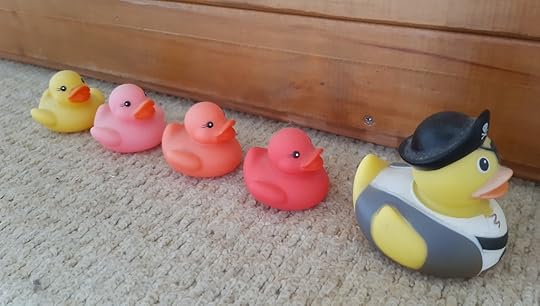 Pirate Duck Mama leads them off to school
Pirate Duck Mama leads them off to schoolBefore I get started on the phrase – where do we get the word duck from? This one goes back to Old English. The original word there for these water birds, from a presumed root word (aneti), was ened. Thankfully as some point during the Old English period this was replaced by duce (a ducker) drawn from the verb ducan (to duck or dive) so the bird was named for what it does, ducking underwater to find its dinner.
By the late 1500s you might be called duck or ducky as an affectionate term. We humans have liked ducks for many centuries. Duckys was also used as slang for breasts by King Henry VIII in a letter to Anne Boleyn in 1536. Another drawback for being a monarch, they never destroy your letters.
Now for the phrase. If you’ve ever seen a mother duck leading her brood from nest to water then you’ll probably have noticed that the ducklings follow her closely in a line from beak to tail, like the way young elephants follow the matriarchs of their family by holding tails with their trunks. It’s highly probable that this organised manner of preparing for a swim leads us to getting your ducks in a row.
However, there are other contenders for the history of this phrase and they merit inclusion here as they are widely spread even without proof in print. As usual the earliest citation is important. In this case it appears to be this line in the Washington Post, June 1932 – “We have a world filled today with problems and we are trying to get our economic ducks in a row”.
Two of the possible origin stories for the phrase are drawn from the world of sport. The first comes from pool (a game similar to billiards and snooker). A duck is the pool term for a ball sitting right in front of a pocket, an easy shot. To have your ducks in a row in this case is to have all your balls sitting in front of pockets, ready to be sunk in series. Thus far there’s no sign of the phrase in print relating to this auspicious state of play but it’s possible.
The second comes from ten pin bowling. Early bowling pins were shorter and fatter than the ones we use today and they were nicknamed ducks, probably because of their squat shape. This was a time before machines reset the pins between attempts. Hence having your ducks in a row meant you had reset the pins yourself and were ready to bowl another ball.
Other theories reference the shooting of a row of tin ducks at a fair-ground range, and the organised way wild ducks and geese fly in a V formation through the sky, hence keeping the entire group on track, just like mother duck and her ducklings.
For the moment at least, the jury is out on this one but I think we can agree that ducks both in the air and on the ground are organised creatures which inspire us to get our act together.
Until next time, happy reading, writing, and wordfooling,
Grace (@Wordfoolery)
August 15, 2022
The History of Parasol – the Original Sun Protection
I’ve no idea what the weather is like today as I’m writing this post a week in advance, knowing that I’ve planned some time off. However I’m hoping it’s a sunny Monday wherever you are. If so, particularly if like me you’re vulnerable to sunburn, consider grabbing a parasol and enjoying one of the early forms of sun protection.
The word parasol joined the English language in the early 1600s so despite my BBC drama fueled notions that they arose in the Georgian period (1714-1830), they were presumably in use during the 1600s. Could Queen Elizabeth I (1533-1603) have used one? Or perhaps her successor’s wife, Queen Anne?
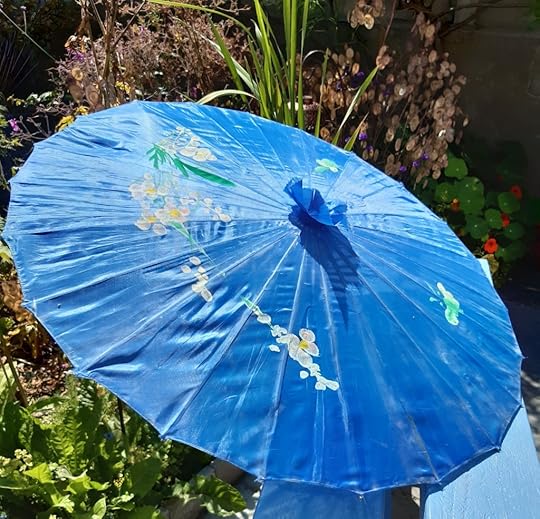 My Roman parasol in my garden
My Roman parasol in my gardenThe Tudors were late to the party as the ancient Egyptians were fond of proto-parasols such as tree leaves and palm fronds over 4,000 centuries ago. I haven’t fully researched their history but apparently they were originally used by persons of high rank in the East and later by fashionable women in Europe where, until Coco Chanel, the idea of having skin browned by outdoor work showed you were lower class. How things change with time, eh?
When parasol arrived in English, as a direct borrowing from French, it described a light portable screen or canopy carried to shield you from the sun, which is a pretty broad definition. The French had borrowed the word from the Italians (parasole in their case) who had formed it very literally from Latin – para (defense against) and sole (sun, solem in Latin).
Para comes from the Latin verb parare which means to ward off or to make ready and you will find it in parachute and parapet as well.
Sol and solem arose from the root word sawel (sun) which also gives English words like solar, south, sun, and solstice.
Given the Italian and Latin influence on the word it seems right that I bought my own parasol in Rome years ago. Wherever you are today if you’re out in the sun remember your sun-screen and your parasol.
Until next time, happy reading, writing, and wordfooling,
Grace (@Wordfoolery)
August 8, 2022
The Origin of the Cognoscenti
Hello,
If the cognoscenti are people who know things, the ones in the know, then do you know the singular of cognoscenti?
It’s cognoscente, which you might have been able to deduce if you learned Latin or Italian at school. Or perhaps you’re a language cognoscente and just know these things?
 Sherlock was a cognoscente of knowledge and sleuthing
Sherlock was a cognoscente of knowledge and sleuthingThe word cognoscente describes a connoisseur, an aficionado. You might be a cognoscente of Italian opera, Korean pop music, or Irish artisan cheeses. To be one you’d want to know your stuff in a big way. You’d be expert, enthused, and steeped in knowledge.
Cognoscente (and cognoscenti) joined English in the late 1700s as a direct borrowing from Italian into English and it has been with us ever since. The Italians had inherited it from Latin as conoscente which translated literally as knowing man from the Latin term for connoisseur – cognoscentum. Cognoscentum was formed from the verb cognoscere (to recognise or get to know) and ultimately from the joining of com (together) and gnoscere (to know).
Co (or com) give us modern terms like co-worker and co-conspirator – people you work or scheme with.
Gnoscere traces back to gno, a root word whose influence we can discern in terms like ignorant, cognition, incognito – all related to knowing, or not knowing, something.
If you were to join the cognoscenti, what would be your area of deep knowledge? Something to ponder.
Until next time, happy reading, writing, and wordfooling,
Grace (@Wordfoolery)
August 1, 2022
The Jolly History of Jackanapes
Hello,
I haven’t explored a foolish word in some time so this week let’s take a look at jackanapes. Before we venture into the many different suggested etymologies for this one, what does it mean? It’s not used very much these days but the dictionaries give three meanings.
an impudent or conceited mana cheeky or mischievous childa monkey or apeI still hear adults sometimes teasing a child by calling them a cheeky monkey, I imagine that was covered under jackanapes back in the day. Exactly how far back is that day?
Merriam Webster reckon first usage was 1529 (with the monkey sense) and Etymology Online plump for mid 1400s. Certainly it was in use by 1597 when Shakespeare wrote “I will teach a scurvy jackanape priest to meddle or make” in Act I of “Merry Wives of Windsor”. Judging by how much my blog-editing tool dislikes the word, modern dictionaries don’t always include jackanapes, although it does appear in my battered 1984 Collins Compact from my school days.

Finding the story behind jackanapes is even trickier than convincing a modern editing tool that it’s part of the English language.
Merriam Webster pin the blame on English history, the Hundred Years’ War (1337-1453) in fact. One of the main commanders on the English side was William de la Pole (Duke of Suffolk) and when England lost its territories in northern France a large chunk of the blame was laid at his door. To such an extent that he was murdered for it in 1450.
They think his nickname, used to mock him for his military failure, was Jack Napis. Jack was a common term for somebody you deemed below you in society. The api part was a reference to the duke’s crest which featured an ape’s clog. I was pretty sure apes didn’t wear clogs, and they don’t. It’s a weight used with a chain to restrain a captive primate (think ball and chain, I guess). They assume Jack Napis gradually slurred into jackanapes.
It’s one of the earliest stories for the origin but if he died in 1450 and the word wasn’t much recorded until the 1500s, then I wouldn’t be entirely sure of that one.
“Brewer’s Dictionary of Phrase and Fable” adds more theories, and confusion. He says Jack was a term for a monkey and that napes could have roots in ape (making it mean monkey monkey?) or in the town of Naples in Italy. Naples, a busy sea port, exported many items. They exported fustian cloth and it was called fustian-a-napes to indicate its source in Naples. It’s not a huge leap to think they also traded in captive apes and we got jack-a-napes.
Etymology Online, as usual, adds to the story. They’re not sure of the source (and neither am I) but mention Century Dictionary claims it was originally somebody who exhibited performing apes. It does sound like a term for a street entertainer and they probably did have to project a pushy, conceited persona to attract an audience. It’s possible.
The gem they leave us with is this – there is a female version – Jane-of-apes who was defined as a pert or forward girl. Jane, of course, is a common name anyhow but it does provide a lovely link back to the Lord of the Apes, Tarzan, whose girlfriend was called Jane.
Until next time, happy reading, writing, and wordfooling,
Grace (@Wordfoolery)
p.s. Oook!
July 25, 2022
Dirigibles, Directors, and Addresses
Hello,
This week’s word is dirigible, mostly because it’s fun to say. We don’t use it often now, except within steam punk books and films. What is a dirigible? It’s both a noun and an adjective. The noun form is a large aircraft without wings consisting of a large balloon filled with gas lighter than air and driven by engines. You might also know it by the name zeppelin.
Zeppelin is one of the eponyms covered in my book “How to Get Your Name in the Dictionary”. Zeppelin airships were named for the German general and aeronautical pioneer Count Ferdinand von Zeppelin (1838-1917), who served in the American Civil War and the Franco-Prussian War before retiring and building airships. The zeppelins were widely used for passenger flight as shown in “Indiana Jones and The Last Crusade”, and during World War I for bombing runs.
 Could balloon flight make a comeback with dirigibles?
Could balloon flight make a comeback with dirigibles?By the 1930s, zeppelin services flew from Germany to North America and Brazil. Originally the Art Deco spire of the Empire State building was to be a tethering point for such airships but high winds made it impractical. Early versions had no heating for passengers but later ones incredibly, had a smoking room. British rock group Led Zeppelin took the name in defiance of critics when they were told they would go down like a lead balloon.
The Hindenburg, the largest dirigible ever built, was designed to use non-flammable helium but after an American refusal to export it, hydrogen was used instead, contributing to the terrible fire which largely removed dirigibles from our skies.
The revival of airship travel may be on its way. Ships using helium produce much lower climate damaging emissions than jet aircraft. They’ve been used for passenger services 2008-2012, sightseeing trips in Austria, and ten have been ordered for commercial flights across European skies from 2026. There are issues still to resolve (sustainable helium supplies for a start) but dirigibles may be making a comeback.
Dirigible entered the English dictionary in 1885 as a shortening of dirigible balloon which is where we get to the adjective use of the word. Dirigible the adjective is defined as something which may be controlled, directed, or steered. The adjective version entered the language in the late 1500s from French, and ultimately from Latin dirigere (to set straight).
The Latin verb dirigere provides some other words to English. From the late 1300s, it gave us the word direct which was associated with the idea of addressing a note to somebody, to point out a course, to guide, or to send in a straight line. These are all still in use today. You may also come across the idea of directing a letter, i.e. addressing an envelope.
By the early 1400s, directing had gained the idea of governing actions and telling people what to do, a sense we retain in the film and TV industry today and which arose in the early 1900s with the rise of those technologies. By the 1600s, you might direct something to happen. It was like issuing an order. It’s no surprise that the director of a company or organisation is the one giving the orders and setting the course for the company.
It is yet to be seen if dirigibles will fill our skies once more, but the word is still entwined in our everyday lives every time we ask for directions from a Sat Nav system, watch a movie, and steer ourselves or our vehicles.
Until next time, happy reading, writing, and wordfooling,
Grace (@Wordfoolery)
July 18, 2022
Getting Down to the History of Inferno
Hello,
This week’s word, with a nod to our current hot weather, is inferno. It has been an English word for hell since 1834 thanks to Dante’s “Divine Comedy”. Dante wrote in everyday Italian (primarily in Tuscan dialect but he ranged about) and inferno is a direct borrowing from that.
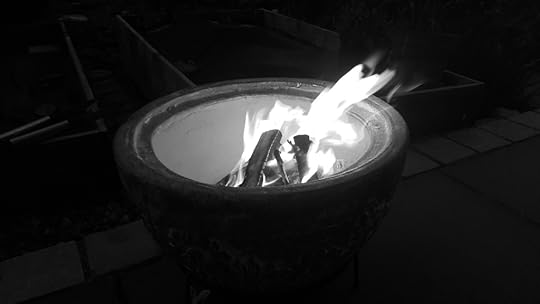 Gather around Wordfoolery’s firepit
Gather around Wordfoolery’s firepitInferno came to Italian from Late Latin infernus (hell) and in classical Latin the way to describe something as lying underground or in lower regions (think underworld in general) ultimately from the prefix infra-. Infra used in this way brings a meaning of below or under and has links to earlier root words and even Sanskrit adnah (below).
Infra is sometimes used as an opposite to super, especially in science fiction and infra dig means something or somebody is demeaning or beneath one in British English slang (although I think that might be old-fashioned for today’s teens).
Other variants of inferno exist too. Anything infernal relates to the underworld (since the late 1300s). In Latin inferi were the dead, the residents of the infernal regions. Readers of Harry Potter books may recall the inferi encountered by Dumbledore and Harry in an underground cave, who were corpses re-animated by dark magic.
Associations with the Christian idea of hell added extra meanings to these words. By the early 1400s you might call something infernal if it was devilish or hateful. By 1600 something infernal was suitable for hell and by 1928 a large fire was called an inferno. Hollywood gave use the original “Towering Inferno” movie in 1974 – one I watched at too young an age with an older sibling and gave me a healthy fear of fire in skyscrapers.
Thankfully thus far we’ve avoided wildfire infernos in Ireland during this heat (thanks to the cooling influence of the Atlantic) but it doesn’t feel like that today.
Until next time, happy reading, writing, and wordfooling,
Grace (@Wordfoolery)
July 11, 2022
Paraphernalia – a Woman’s Word
Hello,
This week’s word is paraphernalia, a term I often use when speaking but never in writing. I had to look up how to spell it! Regular readers will know I enjoy several hobbies in whatever sporadic free time I can carve from a life busy with writing and family. Anybody who delights in crafts will know that each comes with its own paraphernalia.
As a result my home is packed with gardening tools and seeds, beads and wire, stashes of fabric and yarn, and of course, books, many books. I am definitely a woman with paraphernalia galore.
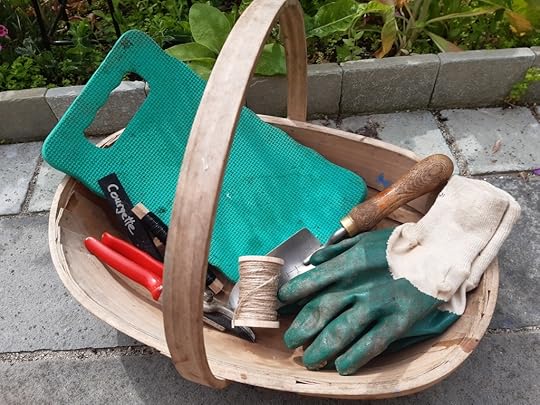 My garden paraphernalia
My garden paraphernaliaI had no idea paraphernalia is actually a word associated with the female of the species, although I suspect my patient husband would claim that was very clear from the balance of male versus female “stuff” in our home.
Paraphernalia was originally a legal term in English, from the mid 1600s, and it denoted a woman’s property besides her dowry. It came to English from the Medieval Latin phrase paraphernalia bona (parahernal goods) which in turn sprang from Late Latin parapherna, a Roman legal term for the same idea. The Latin term was borrowed from Greek parapherna which is compounded from para (beside) and pherne (dowry). Pherne comes from pherein (to carry) and ultimately from a root word bher (to carry or to bear children).
Paraphernalia in the legal sense were items such as her clothing and jewellery which a widow was entitled to retain even in the face of claims from her husband’s creditors. The term is still used legally today to describe equipment relating to the creation or consumption of illegal drugs.
The idea of paraphernalia being equipment or kit for a task arose in the 1700s and has been with us ever since, presumably because a woman’s paraphernalia would have been such items, perhaps for skills like brewing, baking, crafting etc. I’m very happy not to have been involved in any dowry negotiations before marriage but I like the idea that by using my gardening kit or crafting paraphernalia I am following in the footsteps of talented women of history.
Until next time, happy reading, writing, and wordfooling,
Grace (@Wordfoolery)



